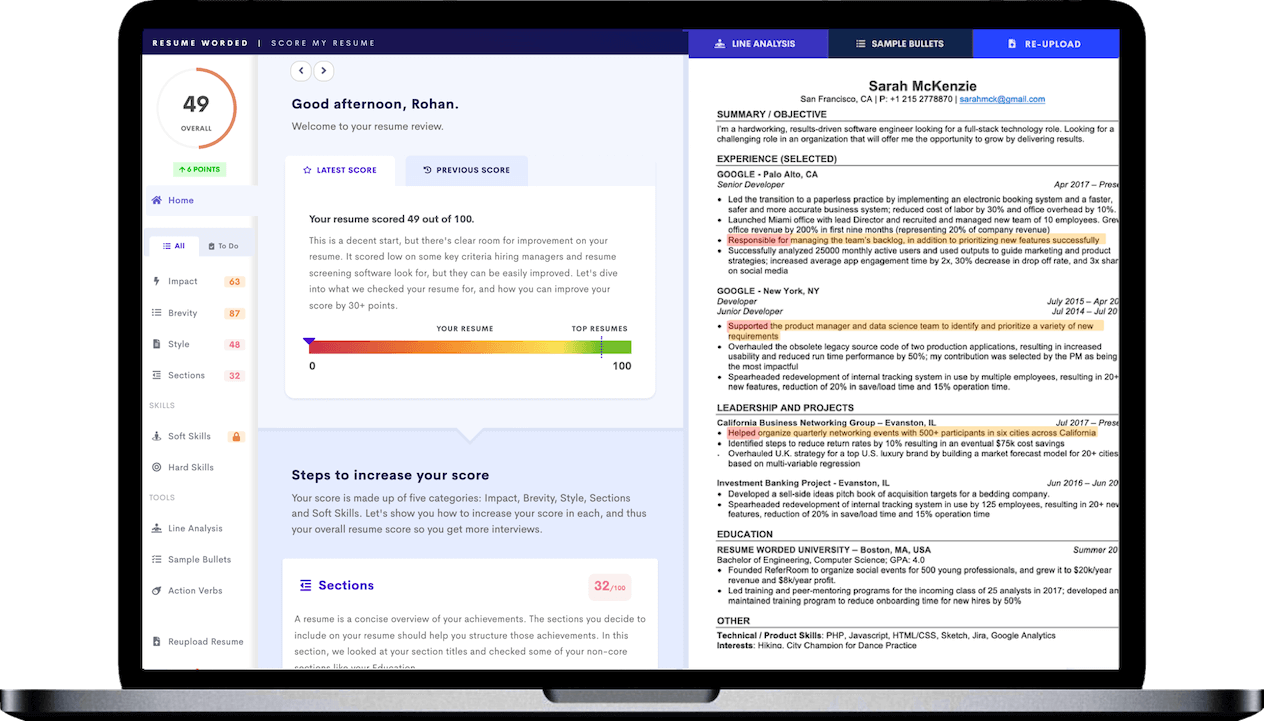Quantify your technical impact
'Optimizing code performance' is impressive, but what makes it stand out is how you quantified its impact - by reducing server response time by 30%. Good developers code. Great ones improve performance measurably.
Approved by hiring managers, here are proven resume summary examples you can use on your Software Developer resume. Learn what real hiring managers want to see on your resume, and when to use which.
'Optimizing code performance' is impressive, but what makes it stand out is how you quantified its impact - by reducing server response time by 30%. Good developers code. Great ones improve performance measurably.
'Creating efficient, scalable databases' shows that you know the importance of data management and can optimize it for better performance. It's a significant skill in data-driven environments and will definitely catch the attention of hiring managers.
'Integrated third-party APIs' is a clear example of your ability to enhance product functionality. It shows that you're not only focused on building things from scratch but also on integrating existing solutions to enrich the product's capabilities.
A great resume can open doors to new opportunities. But a subpar one can keep you stuck in your job search. Our tool helps you create a resume that showcases your skills and experience in the best possible light. Get started now and see the difference for yourself.Score My Resume Now

Underlining your capability to create intuitive, responsive web designs is vital, particularly in a field like frontend development. It subtly tells recruiters that you understand user experience and can build user-friendly websites. It also implies that you can adapt to the ever-changing digital landscape and user preferences.
Improving website accessibility isn't just a technical skill, it's a display of empathy and inclusivity. By mentioning this, you show your commitment to creating a user-friendly experience for everyone, irrespective of their abilities. This can set you apart in a sea of developers who focus only on design and functionality.
By 'building robust and high-performing applications from scratch', you make it clear that you can handle the full life cycle of a project, not just a part of it. This broad expertise can be invaluable.
With 'improving backend efficiency', you demonstrate a deep understanding of the hidden part of software development that users don't see but experience. It shows that you know how to keep everything running smoothly behind the scenes.
By mentioning 'creating user-friendly interfaces', you're showing you understand that coding isn't just about function, but form too. It shows your ability to empathize with users and create a positive user experience.
'Learning new technologies' quickly shows you're not just stuck in your ways and are able to adapt. It's an amazing asset in a field that's constantly evolving with new languages and frameworks.
Emphasizing your history of developing engaging, high-performance mobile applications shows that you understand what users want and need. This is a crucial skill in a mobile app developer, as the market is highly competitive. It signals that your apps aren't just technically sound, but also engaging enough to retain users.
Stating that you used Swift and Objective-C to optimize app performance and reduced crashes by 20% quantifies your skills. This not only gives credibility to your claim of improving app performance, but also shows potential employers the kind of impact you can bring to their business.
By focusing on 'data-driven decision making', you show that you don't just code, you think strategically and use data to guide your development decisions. This can be a game-changer in developing effective software.
'Spearheading a DevOps culture' shows you're not just a coder, but a leader who can drive change and improve processes. It's a clear signal that you're ready for more than just programming tasks.
'Developing secure, resilient systems' speaks volumes about your ability to think about the bigger picture - the security and durability of applications. It helps to reassure potential employers about the safety and longevity of their projects with you on board.
'Increasing system responsiveness' is a tangible way to showcase your impact on improving software. It's a clear statement of the value you've added to your past employers and the value you could add to your next one.

"My free resume review was truly eye-opening. I found out why I wasn't getting interviews and exactly what to add to get past resume screeners. I've already had way more callbacks since I used it. I recommend it to all my friends who are job searching."

"Probably the best thing I've done this year. Showed me what my strengths were and the jobs and industries I should be focusing on. The most impactful part though was how it identified this spiral I'd been doing subconsciously - yikes, freakishly accurate."

Thank you for the checklist! I realized I was making so many mistakes on my resume that I've now fixed. I'm much more confident in my resume now.
The power of specificity
When you state that you are experienced in 'building scalable web applications', this is not just a vague claim. You're giving me something concrete to look at, showing you understand the importance of application scalability in the software development world. This tells me you can handle growth and changes in workload.